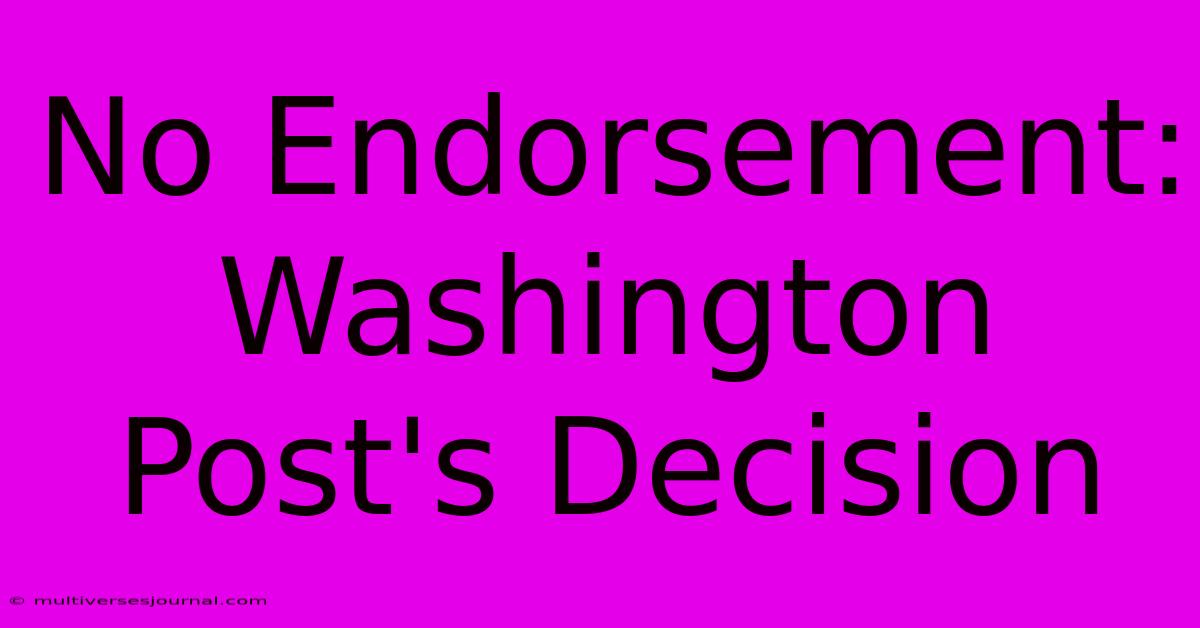No Endorsement: Washington Post's Decision

Discover more detailed and exciting information on our website. Click the link below to start your adventure: Visit Best Website multiversesjournal.com. Don't miss out!
Discover more detailed and exciting information on our website. Click the link below to start your adventure: Visit Best Website mr.cleine.com. Don't miss out!
Table of Contents
No Endorsement: The Washington Post's Decision and Its Implications
The Washington Post, a renowned American newspaper, made a significant decision in the 2020 presidential election: they chose not to endorse a candidate. This move sparked conversations about the changing role of media in a polarized political landscape and the impact of endorsements on public opinion.
Why the Washington Post Declined to Endorse
The Washington Post's editorial board cited several reasons for their decision to abstain from endorsing a candidate. They pointed to the highly divisive nature of the 2020 election, arguing that an endorsement could further inflame partisan tensions. Additionally, they expressed concerns that an endorsement might be perceived as an attempt to influence voters, rather than objectively informing them.
The editorial board emphasized their commitment to journalistic integrity, stating that their primary role is to provide accurate and unbiased news coverage. They believed that endorsing a candidate would undermine this commitment and compromise their credibility in the eyes of the public.
The Impact of the Decision
The Washington Post's decision to forgo an endorsement was met with mixed reactions. Some praised the paper for prioritizing neutrality and avoiding potential biases, while others criticized it for abdicating its responsibility to guide voters.
Proponents of the decision argued that it exemplified journalistic integrity and protected the paper's reputation for objective reporting. They believed that endorsements can be seen as partisan interventions in the electoral process and may discourage readers from engaging with diverse viewpoints.
Critics, however, argued that endorsements are a legitimate part of a free press and can offer valuable insights into the candidates and their positions. They viewed the Washington Post's decision as a missed opportunity to engage in public discourse and offer its perspective on the election.
The Future of Endorsements in Media
The Washington Post's decision to not endorse a candidate in 2020 reflects a broader trend in the media landscape. As trust in traditional media institutions declines and political polarization intensifies, many outlets are re-evaluating their role in the electoral process. Some have opted to reduce or eliminate their endorsements altogether, while others are experimenting with new formats and approaches to engage readers in a more nuanced and inclusive way.
Ultimately, the decision of whether or not to endorse a candidate remains a complex one for media organizations. It requires weighing the potential benefits and drawbacks, considering their commitment to journalistic principles, and understanding the evolving expectations of their audience.
Keywords for SEO
- Washington Post
- Presidential Endorsement
- 2020 Election
- Media Polarization
- Journalistic Integrity
- Political Landscape
- Media Role
- Public Opinion

Thank you for visiting our website wich cover about No Endorsement: Washington Post's Decision . We hope the information provided has been useful to you. Feel free to contact us if you have any questions or need further assistance. See you next time and dont miss to bookmark.
Thank you for visiting our website wich cover about No Endorsement: Washington Post's Decision . We hope the information provided has been useful to you. Feel free to contact us if you have any questions or need further assistance. See you next time and dont miss to bookmark.
Featured Posts
-
Kelsea Ballerinis Baggage And New Music
Oct 26, 2024
-
Karaj Nuclear Facility Hit By Fire
Oct 26, 2024
-
Iran Power Plant Fire Media Silent
Oct 26, 2024
-
Fire Erupts At Iranian Nuclear Facility
Oct 26, 2024
-
Dodgers Vs Yankees World Series Game 1 Starts
Oct 26, 2024
